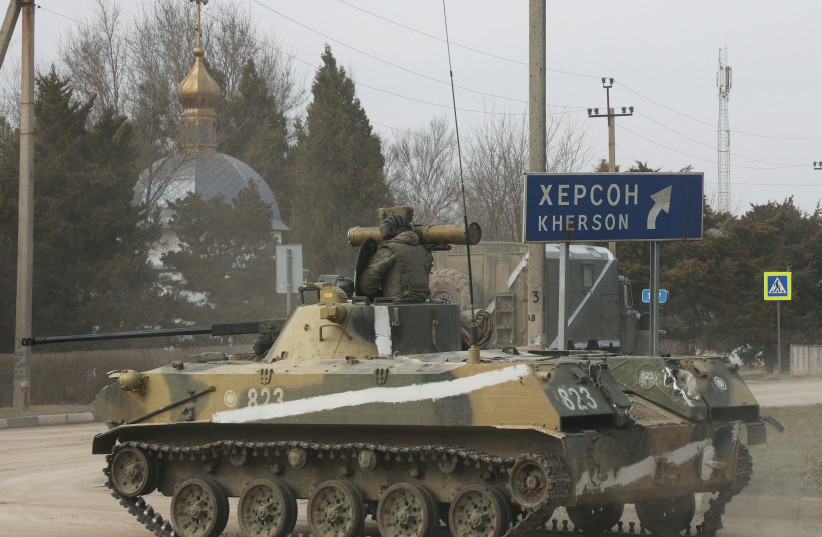Prime Minister Naftali Bennett sent a message of support to the Ukrainian people but did not repeat the condemnation of Russia’s invasion of their country issued hours earlier by Foreign Minister Yair Lapid.
“Like everyone else, we pray for peace and calm in Ukraine,” Bennett said on Thursday as he addressed a graduation ceremony of IDF officers. “These are difficult and tragic moments, and our hearts are with the civilians who through no fault of their own have been thrust into this situation.”
Israel is prepared to offer humanitarian assistance to the Ukrainians, Bennett said.
An hour later he chaired an emergency meeting at the Kirya military headquarters in Tel Aviv to discuss the details of that assistance with top officials including Lapid, Defense Minister Benny Gantz and Finance Minister Avigdor Liberman.
Foreign Ministry Director-General Alon Ushpiz, who also attended the meeting, briefed the group on Russia's constrained response to Israel's position in support of Ukraine, according to Walla. The Russians think that other countries have issued condemnations that were much more severe than Israel's, he said.
The group discussed the diplomatic, economic and security impact of the crisis on Israel and set up a priority list of the immediate concerns. This included efforts to evacuate Israelis from Ukraine, provide assistance to Ukrainian Jews and plans to absorb them as new immigrants in Israel.
The group plans to hold additional meetings to asses the impacts of the Russian invasion that has set off a global crisis.
Bennett told the young men and women at the graduation ceremony that they were setting out at a time “when the familiar world order is changing,” a world “much less stable, and our region is also changing from day-to-day. These times are teaching us that wars between armies are not, to our regret, relics of the past.”
Read more on the Ukraine-Russia War:
Israel, however, “is currently an anchor of strength, stability and security in a difficult region, a region that poses great threats and challenges,” Bennett assured the young officers. “Every Israeli knows that they have a home to return to, that there is someone to look after them in times of trouble.”
Lapid was far blunter when he issued a statement from Jerusalem.

“The Russian attack on Ukraine is a serious violation of the international order,” Lapid said. “Israel condemns the attack, and is ready and prepared to provide humanitarian assistance to the citizens of Ukraine.”
The unequivocal message came a day after Jerusalem released a message supporting Ukraine’s “territorial integrity and sovereignty” without mentioning Russia.
Two senior government sources said Lapid and Bennett’s messages – and the differences between them – were coordinated and meant to be complementary.
“Israel is a country that has experienced wars, and war is not the way to resolve conflicts,” Lapid said. “The first hours and days of any war are also the last time you can still stop and return to the negotiating table, mediated by world powers, to settle disputes peacefully.”
THE FOREIGN minister mentioned Israel’s “deep, long-lasting and good relations with Russia and Ukraine,” as well as the thousands of Israelis and hundreds of thousands of Jews in both countries whose safety is at the top of his considerations.
Foreign Ministry, Nativ and Jewish Agency personnel “are risking their lives to continue to provide assistance and help to every Israeli and every Jew,” he said.
Lapid also called on all Israelis in Ukraine to go to border crossings near Lviv, in Ukraine’s west, and leave the country.
It was a call that Bennett reiterated at the IDF graduation ceremony.
“Leave now,” he urged Israelis in Ukraine.
Bennett did not directly call on Ukrainian Jews to flee the war, but he let them know that they and all Jews had a place waiting for them in Israel.
“Any Jew from anywhere in the world knows that a home awaits them here, with us, and that our door will always be open,” Bennett said.
Israeli diplomats were stationed at crossings on Ukraine’s western border on Thursday to help Israelis evacuate by land, following Russia’s attack on the country and the closure of its airspace.
An estimated 7,000-8,000 Israelis remain in Ukraine, and the Israeli Embassy asked that those who have not yet done so register on its website (survey.gov.il/ru/israelinuk) to receive updates.
Ambassador to Ukraine Michael Brodsky told KAN TV that Israel “is asking Israelis to reach the border crossing with Poland independently. We are prepared, on the Polish side, to accept Israelis and help them fly to Israel.”
Israeli embassies sent representatives to the Medyka crossing with Poland, the Vysne Nemecke crossing with Slovakia, the Zahony crossing with Hungary, the Siret crossing with Romania and the Planca crossing with Moldova.
The Israel Embassy in Ukraine officially moved to Lviv, near the western border, on Tuesday night to be farther from the more intense war zone in the East, and to help with evacuations.
Though there have been reports of attacks on Lviv as well, the embassy planned to stay, as of Thursday afternoon. However, they have an emergency plan to evacuate to Poland if necessary.
The embassy has received hundreds of phone calls, Brodsky said, but “we are staying here at the moment.”
Hatzalah Jewish rescue services in Uman, Ukraine – the site of hassidic pilgrimages to Rabbi Nachman of Breslov’s grave – “woke up under fire in the morning,” said Hatzalah spokesman Shlomi Elisha. “We prepared buses in advance, but there is chaos at the moment and no driver is willing to drive to the borders. We are coordinating all the efforts to organize buses as much as we can.”
The buses were due to leave from Pushkina Square in Uman, accompanied by security and medical staff.
